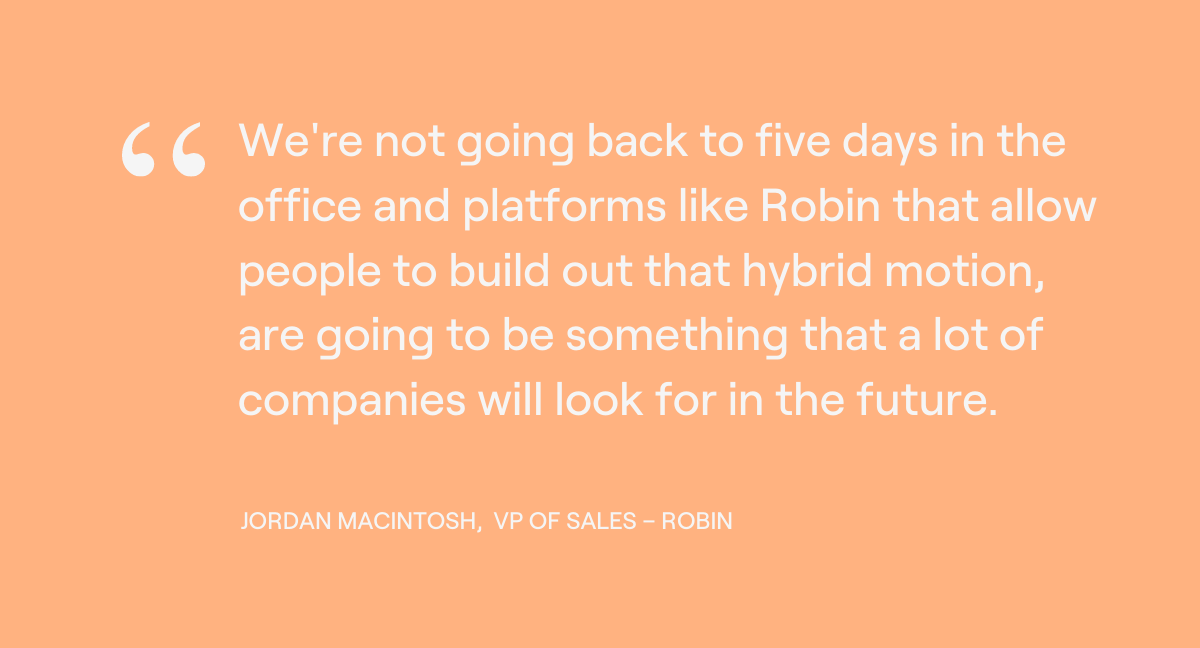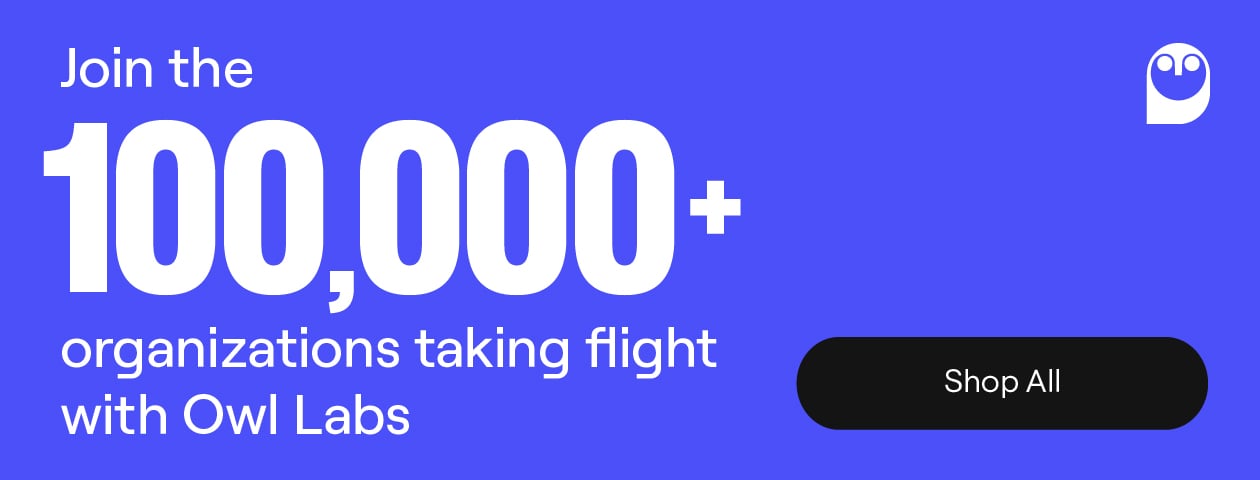At Owl Labs, we facilitate hybrid-friendly work experiences with our intelligent video conferencing and collaboration tools. We’ve sat down with workplace leaders around the world about how hybrid work fits into the future of work, and how to best support employees during major changes. Subscribe to hear from more innovative leaders and look out for new conversations in our Hybrid Leadership Interview Series.
Jordan MacIntosh is a Premier League Lacrosse midfielder and, since 2019, the VP of Sales at Robin, based in Boston, MA. Suffice it to say that he’s a busy guy and has learned to work from anywhere — which is great, because Robin believes it’s people, not places, that drive business success. It’s a software platform used by businesses of all sizes to successfully manage hybrid work, empowering workers to choose how and where they work while providing organizations with the tools and insights needed to succeed.
A longtime hybrid work schedule
Because of the demands of his lacrosse team practices and games all over the continent, MacIntosh has always needed flexibility from his work. For years, since well before COVID, he would work sometimes from home, sometimes from the office, and sometimes, from other cities. He’s a hybrid work pro.
For 10 months of the year, MacIntosh’s schedule looks like this:
- Monday to Thursday: Work from home or in-office at Robin HQ in Boston, MA.
- Thursday night: Fly to wherever the week’s premier league lacrosse game is hosted — he travels about 100,000 miles a season.
- Friday: Work from a hotel and then go to practice.
- Saturday: Play Premier League Lacrosse game
- Sunday: Fly back to Boston and do it all again.
It’s easy to see why he appreciates flexibility at work, and he values empowering his team to work however they work best.
Creating a flexible workplace
As VP of sales at Robin, MacIntosh has led his team through it all: the panic and misery of 2020, the cautious optimism of 2021, and the meteoric growth of the company in 2022. Robin has nearly doubled their headcount this year, and MacIntosh’s sales team is now 85 strong.
Robin has a completely flexible policy where employees can work from anywhere, which is aligned with their mission for more employee choice at work.. “Before 2020, every single person was in Boston, but now we’re about 50/50 split,” he shared. “We have two floors in Fort Point in Boston, and Tuesday, Wednesday, and Thursday are usually our busiest days in the office.”
The hybrid work index, which Robin created to showcase trends among their customers, shows that this is very much in line with global trends. When employees can choose when they’re coming in, they’ll be in primarily on Tuesday to Thursday, so workplace experience teams and facilities managers should plan accordingly.
And Robin is working on always improving collaboration between remote and in-person employees. “The one big pain point of being in office is you have four or five people in, and then you have two or three people on a screen. It can be kind of a weird experience for those folks that aren't in the office,” said MacIntosh.
Being a team leader through COVID and beyond
Like so many other managers in the era of COVID, MacIntosh has had to update his management approach and find new ways to keep his team connected, engaged, and collaborative. “2020 was really hard,” he said. No longer having all of his team within earshot and ready to collaborate in person was a seismic shift.
“Everyone went through this experience when we first left, which was, ’we need to keep the team together and keep people on the same page, let's do a happy hour.’ And by the third one, everyone said, ‘can we please stop doing this?’”
He had to think outside the box and put a huge emphasis on empathy.
Instead of trying in vain to cheer up his team in early 2020, he pushed for a No-BS policy on his team. “There was a lot of BS being thrown around at that time — ‘oh, I’m ok, everything’s all good’ — but I think we did a good job of keeping it real. We tried to be really forthright with how things were going, what we're doing, and how we're going to fix it, which I think was appreciated.”
“Being an empathetic leader took on a whole new meaning during the last two years,” he shared. “The biggest thing I learned is the resiliency of the people on my team. It was just amazing.”
Robin was ready to meet the moment
Selling workplace software through the lockdowns and office closures of 2020 was near-impossible, but the team pulled through. “I’m really proud to have been a part of it,” shared MacIntosh.
Luckily, 2021 was a turning point for the company. As companies across the nation started reopening offices, they turned to Robin’s technology to create seamless work experiences for their teams.
“We had everyone in the company in one channel watching all the deals come in and celebrating getting to new business milestones. Little things like that, where we were involving everyone across the company, it really felt like everyone's pulling in one direction. That was a great way to build some community in a remote environment.”
Quick hiring in a very competitive environment
Since Robin is growing so quickly, and because the hiring market is so hot these days, teams have had to accelerate the hiring process and reimagine the onboarding process.
Onboarding is mostly done virtually, with webinar-style classes instead of the typical classroom-style sales bootcamps. But in order to help hires feel more connected and embed them in the culture of the team, Robin rolled out a perk that gives people the option to take a couple of trips to Boston HQ every year. “We've started to do sales team days where we'll get all the people that are local coming in, and then folks that are remote, flying in for that week. We do a bunch of workshops or happy hours, that kind of stuff,” he shared.
“The biggest thing that's come up over the last six months is the speed at which decisions are happening. We've had many people have great first conversations, and second conversations and then, ‘oh, Hey, I've got four other offers and I've gotta take something.’ It's been super competitive. But we’ve been successful, hired around 60 people in the first four months of the year, leaning on the benefits and perks that we offer.”
Benefits and incentives keep the sales team engaged
At the same time that companies are embracing flexible work, they’re also trying to help nudge employees out of the same home office they’ve been in for two years now. Instead of just offering cash incentives for reaching sales goals, they’ve implemented a platform called Blueboard where employees can be rewarded with experiences, like Red Sox tickets, weekend trips, and hiking excursions.
“Getting to do something that the company is paying for is a cool way to change it up,” said MacIntosh. They’ve also added perks like weekly DoorDash credits for lunch at home, as well as a work-from-home stipend so employees can build their ideal work setups at home.
Hybrid work is the future
MacIntosh is optimistic about the future of hybrid work and Robin’s role in making it feasible for all. “I think people are excited about this space. We're not going back to five days in the office and platforms like Robin that allow people to build out that hybrid motion, are going to be something that a lot of companies will look for in the future.”

Subscribe to the Owl Labs Blog and keep up with hybrid and flexible work trends and best practices.
%20(1).png)
Better meetings start here
From huddle rooms to boardrooms and everything in between, we’ve got you covered with solutions that take teamwork to the next level.
Shop Solutions